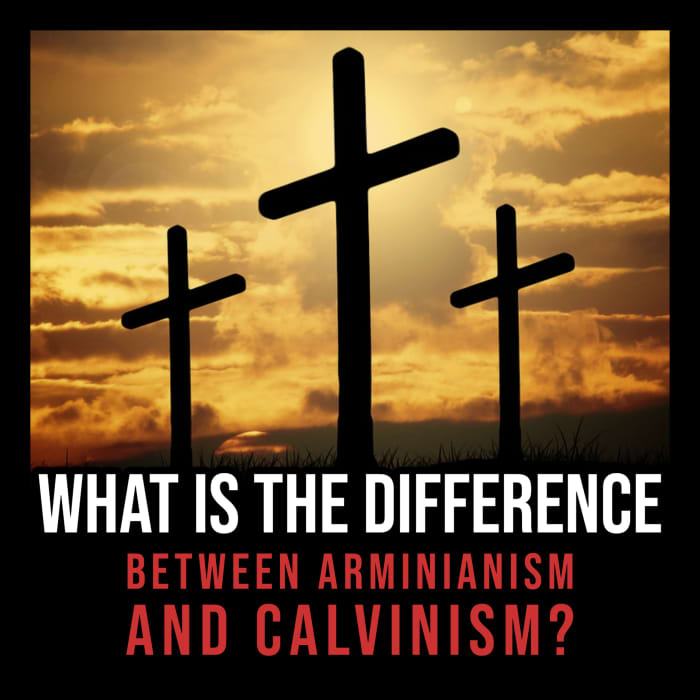Both Arminianism and Calvinism emphasize grace, a central tenet in Christian theology. Grace is understood as God’s unmerited favor, extended to humanity despite their sinful nature. However, these two theological systems differ significantly in their interpretations of grace, human agency, and the doctrines of election and reprobation.
This exploration delves into the historical development, theological influences, and contemporary expressions of Arminianism and Calvinism, providing a comprehensive understanding of their distinctive beliefs and practices.
The Theological Concept of Grace in Arminianism and Calvinism

Grace, an unmerited favor from God, holds central significance in both Arminianism and Calvinism. While sharing this understanding, these theological systems diverge in their interpretations of grace, its role in salvation, and its implications for human agency.
Shared Understanding of Grace
Both Arminianism and Calvinism view grace as a divine gift, undeserved and unmerited by humans. This grace is essential for salvation, enabling individuals to repent and believe in Jesus Christ.
Arminianism’s Interpretation of Grace
Arminians emphasize that grace is resistible and that individuals possess free will to accept or reject it. They believe that God’s grace is universal, extended to all people, and that individuals can cooperate with it through faith.
Calvinism’s Interpretation of Grace
Calvinists hold that grace is irresistible and that it is sovereignly bestowed upon the elect. They believe that God’s grace is particular, only given to those whom he has predestined for salvation, and that individuals are incapable of resisting it.
The Role of Human Agency in Salvation: Both Arminianism And Calvinism Emphasize Grace
Arminianism and Calvinism have contrasting views on the role of human agency in salvation.
Arminianism’s Emphasis on Free Will
Arminians believe that individuals have free will and are responsible for their own salvation. They argue that God’s grace enables them to choose to repent and believe, but that the ultimate decision rests with them.
Calvinism’s Doctrine of Predestination
Calvinists hold that God has predestined some individuals for salvation (the elect) and others for damnation (the reprobate). They believe that human agency is limited, and that the elect are chosen by God’s grace alone, regardless of their own actions.
Doctrines of Election and Reprobation

Arminianism and Calvinism have distinct doctrines regarding election and reprobation.
Arminianism’s Conditional Election
Arminians believe that God elects individuals based on his foreknowledge of their faith. They argue that election is conditional upon faith and that individuals can lose their salvation if they fall away from the faith.
Calvinism’s Unconditional Election and Reprobation
Calvinists hold that God elects individuals unconditionally and that reprobation is the logical consequence of non-election. They believe that the elect are chosen by God’s sovereign grace, regardless of their actions, and that the reprobate are destined for damnation due to their sin.
Practical Implications
The different understandings of grace, human agency, and election have shaped the practical expressions of Arminianism and Calvinism.
Church Polity
Arminians tend to favor a congregational polity, emphasizing the autonomy of local churches. Calvinists, on the other hand, often adopt a presbyterian polity, with decisions made by a council of elders.
Worship Practices
Arminian worship services often include lively music and emotional preaching, emphasizing the personal experience of grace. Calvinist worship services are typically more formal and structured, focusing on the sovereignty of God.
Evangelistic Strategies, Both arminianism and calvinism emphasize grace
Arminians believe that evangelism should focus on persuading individuals to repent and believe in Jesus Christ. Calvinists, on the other hand, believe that evangelism should focus on proclaiming the sovereignty of God and the need for his grace.
Historical Development and Theological Influences

Arminianism and Calvinism have been shaped by historical events and theological influences.
Origins of Arminianism
Arminianism emerged in the early 17th century as a response to Calvinism. It was formulated by Jacobus Arminius, a Dutch theologian, and his followers, known as the Remonstrants.
Origins of Calvinism
Calvinism emerged in the 16th century as a system of theology developed by John Calvin, a French theologian and Reformer. It became the dominant theology of the Reformed churches.
Key Theologians and Movements
Other key theologians and movements that have influenced the development of Arminianism and Calvinism include Augustine of Hippo, Martin Luther, and the Puritans.
Contemporary Expressions

Arminianism and Calvinism continue to be influential theological systems in the contemporary world.
Branches and Denominations
Arminianism is found in various Protestant denominations, such as Methodists, Baptists, and Pentecostals. Calvinism is found in Reformed denominations, such as Presbyterians, Reformed Baptists, and Congregationalists.
Modern Interpretations
Modern interpretations of Arminianism and Calvinism have evolved and adapted to changing cultural and intellectual contexts. Some contemporary theologians have sought to find common ground between the two systems, while others have emphasized their distinctiveness.
Query Resolution
What is the key difference between Arminianism and Calvinism regarding human agency?
Arminianism emphasizes free will and human responsibility, while Calvinism adheres to the doctrine of predestination, which asserts that God has predetermined who will be saved and who will not.
How does the doctrine of election differ between the two systems?
Arminianism believes in conditional election based on foreseen faith, while Calvinism holds to unconditional election and reprobation, which means that God chooses some for salvation and others for damnation regardless of their actions or beliefs.
What are some practical implications of these theological differences?
Arminianism tends to promote a more optimistic view of human nature and emphasizes the importance of personal evangelism, while Calvinism often leads to a more somber view of humanity and a focus on God’s sovereignty in salvation.